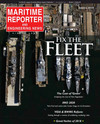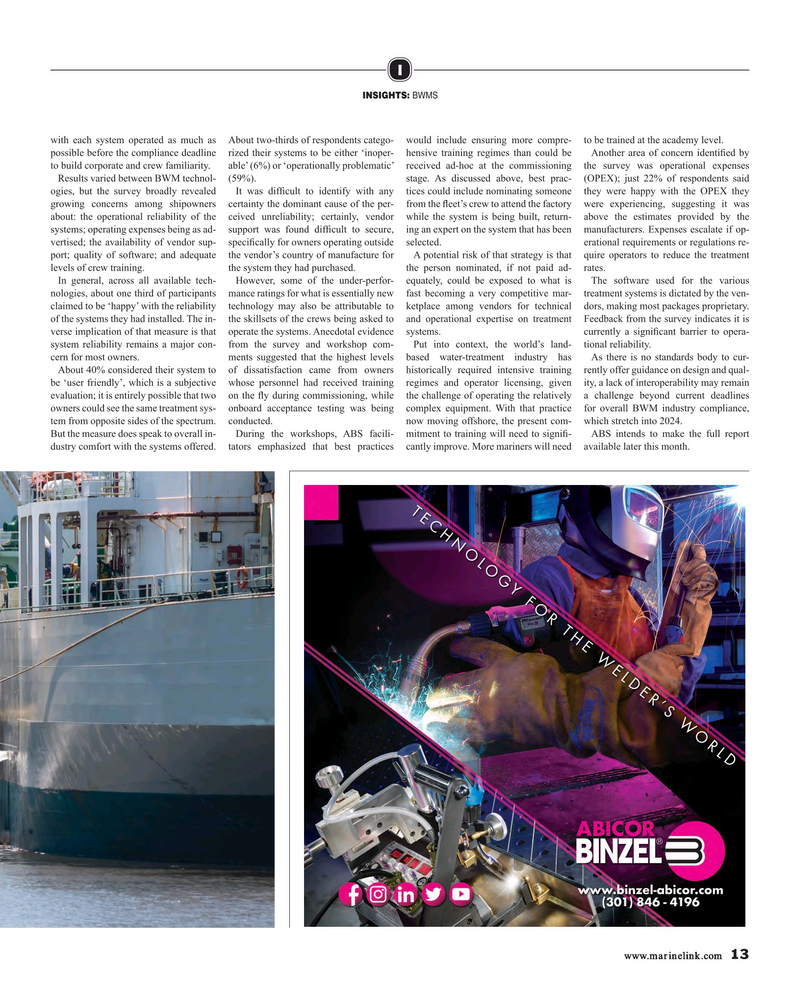
Page 13: of Maritime Reporter Magazine (January 2019)
Ship Repair & Conversion: The Shipyards
Read this page in Pdf, Flash or Html5 edition of January 2019 Maritime Reporter Magazine
I
INSIGHTS: BWMS with each system operated as much as About two-thirds of respondents catego- would include ensuring more compre- to be trained at the academy level.
possible before the compliance deadline rized their systems to be either ‘inoper- hensive training regimes than could be Another area of concern identi? ed by to build corporate and crew familiarity. able’ (6%) or ‘operationally problematic’ received ad-hoc at the commissioning the survey was operational expenses
Results varied between BWM technol- (59%). stage. As discussed above, best prac- (OPEX); just 22% of respondents said ogies, but the survey broadly revealed It was dif? cult to identify with any tices could include nominating someone they were happy with the OPEX they growing concerns among shipowners certainty the dominant cause of the per- from the ? eet’s crew to attend the factory were experiencing, suggesting it was about: the operational reliability of the ceived unreliability; certainly, vendor while the system is being built, return- above the estimates provided by the systems; operating expenses being as ad- support was found dif? cult to secure, ing an expert on the system that has been manufacturers. Expenses escalate if op- vertised; the availability of vendor sup- speci? cally for owners operating outside selected. erational requirements or regulations re- port; quality of software; and adequate the vendor’s country of manufacture for A potential risk of that strategy is that quire operators to reduce the treatment levels of crew training. the system they had purchased. the person nominated, if not paid ad- rates.
In general, across all available tech- However, some of the under-perfor- equately, could be exposed to what is The software used for the various nologies, about one third of participants mance ratings for what is essentially new fast becoming a very competitive mar- treatment systems is dictated by the ven- claimed to be ‘happy’ with the reliability technology may also be attributable to ketplace among vendors for technical dors, making most packages proprietary. of the systems they had installed. The in- the skillsets of the crews being asked to and operational expertise on treatment Feedback from the survey indicates it is verse implication of that measure is that operate the systems. Anecdotal evidence systems. currently a signi? cant barrier to opera- system reliability remains a major con- from the survey and workshop com- Put into context, the world’s land- tional reliability. cern for most owners. ments suggested that the highest levels based water-treatment industry has As there is no standards body to cur-
About 40% considered their system to of dissatisfaction came from owners historically required intensive training rently offer guidance on design and qual- be ‘user friendly’, which is a subjective whose personnel had received training regimes and operator licensing, given ity, a lack of interoperability may remain evaluation; it is entirely possible that two on the ? y during commissioning, while the challenge of operating the relatively a challenge beyond current deadlines owners could see the same treatment sys- onboard acceptance testing was being complex equipment. With that practice for overall BWM industry compliance, tem from opposite sides of the spectrum. conducted. now moving offshore, the present com- which stretch into 2024.
But the measure does speak to overall in- During the workshops, ABS facili- mitment to training will need to signi? - ABS intends to make the full report dustry comfort with the systems offered. tators emphasized that best practices cantly improve. More mariners will need available later this month.
www.marinelink.com 13
MR #1 (10-17).indd 13 MR #1 (10-17).indd 13 1/11/2019 9:43:52 AM1/11/2019 9:43:52 AM

 12
12

 14
14
